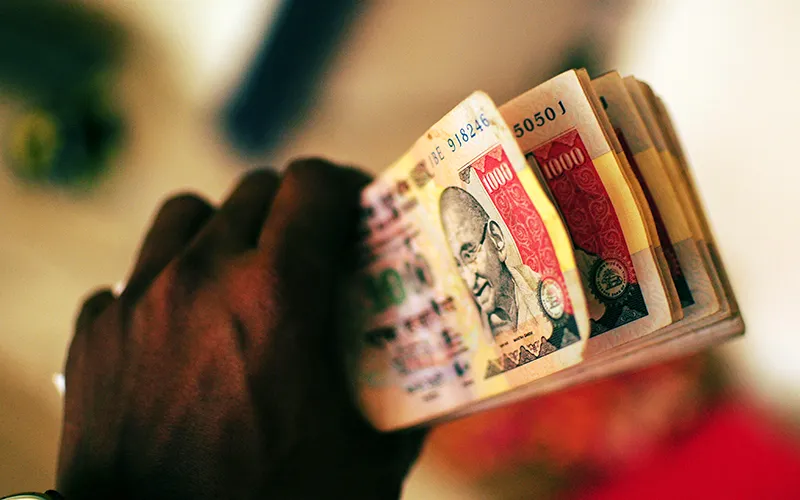-
CENTRES
Progammes & Centres
Location

"Remember SUUTI? Yes this acronym pops up every once in a while in every central government's tenure. The Specified Undertaking of Unit Trust of India, a dinosaur of the past, is sitting on a treasure trove that for some strange reason nobody wants to nudge or disturb. Thanks to the commodity downturn over the last year or so, the BJP administration is much better placed than anyone over the last 15 years in terms of meeting fiscal deficit and current account deficit targets since crude prices have fallen off the cliff and gold has remained benign. In the past, Governments have been loathe to touch these strategic holdings of SUUTI.
Three blue chips - ITC (11.27 per cent), Axis Bank (11.72 per cent) and L & T (8.18 per cent) - are a virtual goldmine for the government. These shares are vested with SUUTI, a function of the UTI practically going bust after its chairman P S Subramanyam and rogue stock broker Ketan Parekh emasculated India's domestic bull. As such, these shares have been lying with SUUTI since 2003 with no move whatsoever to sweat these assets productively, forget selling them. Except for one meaningful attempt in March 2014 when a partial divestment in Axis Bank resulted in 4.2 crore shares or approximately nine per cent through a block deal in a price range of Rs 1313 - 1341 per share raising Rs 5557 crore. The Govt continues to hold 11.72 after the sale.
The objective was obviously to raise revenues from this divestiture to meet disinvestment targets, but equally an attempt must have been made for a wider dispersal of shares with more entities participating. But as usual LIC bought 85.46 lakh of these shares, followed mercifully by New World Fund (26.88 lakh), Goldman Sachs (23.5 lakh shares) and Citi Group Global (38.2 lakh shares) among other institutional investors. The average price was Rs 1315 per share, a discount of 3.07 per cent to the previous day's market closing price. A six month lock in period existed on the sale of the shares at that point in time. LIC now holds approximately 11.14 per cent in Axis Bank. Normally, LIC, buyer of the last resort in such govt divestments like in the Indian Oil offer for sale a fortnight or so ago when it had to mop up almost 90 per cent of the shares on Manic Monday did not have to buy aggressively because Axis Bank had other suitors that day. Such is the exalted status of Axis Bank in the private Indian bank universe, that LIC could only pick up 20.23 per cent shareholding out of the shares on offer. Probably making the government realise that all three companies were blue blooded.
I must add here that they have powerful managements, particularly ITC and L & T. For an ITC, a divestiture is probably not a good idea because this way it has ring fenced itself against any attempt by say a BAT to ramp up its shareholding in the company. British American Tobacco owns almost 25 per cent stake in ITC and the company chairman Yogi Deveshwar has constantly thwarted BAT in increasing its holding.
At other times other ideas have been toyed with but no avail. The concept of an ETF leveraging the SUUTI shareholding was also thought of, but no roll out took place. Sometime in mid September 2014, Arvind Mayaram finance secretary who was soon to find himself shunted to the boondocks had spoken about an Exchange Traded Fund for the SUUTI shareholding. The plan was to do an ETF on the lines of the 10 PSU ETF launched earlier last year in March, which has done extremely well since. One can argue that the government doesn't need to desperately sell SUUTI shares right now, but at least monetise the holdings in a more efficient manner. A RFP (request for proposal) from asset management companies was asked for during this exercise, and then everything suddenly went quiet.
THE RFP document said that the ETF could be launched as a New Fund Offer followed by further tranches or a tap structure, and SUUTI and government may provide appropriate discount for different investors, in the form of a suitable mix of upfront and back end loyalty discount. The idea was to enlarge the offering of the ETF by including seven other state run companies to make it more robust. It was a great idea at monetisation but pushed back for no reason. By December last year, fin min officials said the process for the ETF route had been proving 'too complicated' since the beginning. ""You need at least 10 companies in an equity ETF ( an exchange-traded fund (ETF) is an investment fund traded on stock exchanges, much like stocks. An ETF holds assets such as stocks, commodities, or bonds, and trades close to its net asset value over the course of the trading day. Most ETFs track an index, such as a stock index or bond index). You need to work out which companies and sectors you want to include. Bunching PSUs with the three listed Suuti companies was proving a challenge."" And that was the end of it. At different times over the last year and a half, the value of these SUUTI holdings has been between Rs 55,000 to Rs 62,000 crore. So, let us forget outright sale of this holding if that is perceived to be strategic by the government, at least look at sweating these assets in a market which has stayed more or less buoyant for almost 15 months now. Let retail investors make money off these best of breed shares. "
The views expressed above belong to the author(s). ORF research and analyses now available on Telegram! Click here to access our curated content — blogs, longforms and interviews.